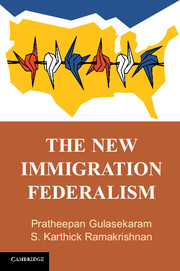Crossref Citations
This Book has been
cited by the following publications. This list is generated based on data provided by Crossref.
Pedroza, Juan Manuel
2015.
Deportation Discretion: A Measure of Immigrantss Context of Reception.
SSRN Electronic Journal,
Conlan, Timothy J.
and
Posner, Paul L.
2016.
American Federalism in an Era of Partisan Polarization: The Intergovernmental Paradox of Obama’s “New Nationalism”.
Publius: The Journal of Federalism,
Vol. 46,
Issue. 3,
p.
281.
McDaniel, Eric L.
Nooruddin, Irfan
and
Shortle, Allyson F.
2016.
Proud to be an American?: The Changing Relationship of National Pride and Identity.
The Journal of Race, Ethnicity, and Politics,
Vol. 1,
Issue. 1,
p.
145.
Bulman-Pozen, Jessica
and
Metzger, Gillian E.
2016.
The President and the States: Patterns of Contestation and Collaboration under Obama.
Publius: The Journal of Federalism,
Vol. 46,
Issue. 3,
p.
308.
Williams, Kim M.
2016.
Black Political Interests on Immigrant Rights: Evidence from Black Newspapers, 2000–2013.
Journal of African American Studies,
Vol. 20,
Issue. 3-4,
p.
248.
Einstein, Katherine Levine
and
Hochschild, Jennifer
2016.
Governing in a Polarized Age.
p.
304.
Reich, Gary
2017.
Immigrant legislation, across and within the United States.
Research & Politics,
Vol. 4,
Issue. 4,
p.
205316801774200.
Vargas, Edward D.
Sanchez, Gabriel R.
and
Valdez, Juan A.
2017.
Immigration Policies and Group Identity: How Immigrant Laws Affect Linked Fate among U.S. Latino Populations.
The Journal of Race, Ethnicity, and Politics,
Vol. 2,
Issue. 1,
p.
35.
Ryo, Emily
2017.
Legal Attitudes of Immigrant Detainees.
Law & Society Review,
Vol. 51,
Issue. 1,
p.
99.
Matos, Yalidy
2017.
Geographies of Exclusion: The Importance of Racial Legacies in Examining State-Level Immigration Laws.
American Behavioral Scientist,
Vol. 61,
Issue. 8,
p.
808.
Ayón, Cecilia
2017.
Perceived Immigration Policy Effects Scale.
Hispanic Journal of Behavioral Sciences,
Vol. 39,
Issue. 1,
p.
19.
Paquet, Mireille
2017.
Wicked problem definition and gradual institutional change: federalism and immigration in Canada and Australia.
Policy and Society,
Vol. 36,
Issue. 3,
p.
446.
Lueders, Hans
Hainmueller, Jens
and
Lawrence, Duncan
2017.
Providing driver’s licenses to unauthorized immigrants in California improves traffic safety.
Proceedings of the National Academy of Sciences,
Vol. 114,
Issue. 16,
p.
4111.
Farris, Emily M.
and
Holman, Mirya R.
2017.
All Politics Is Local? County Sheriffs and Localized Policies of Immigration Enforcement.
Political Research Quarterly,
Vol. 70,
Issue. 1,
p.
142.
Reny, Tyler
Wilcox-Archuleta, Bryan
and
Cruz Nichols, Vanessa
2018.
Threat, Mobilization, and Latino Voting in the 2018 Election.
The Forum,
Vol. 16,
Issue. 4,
p.
573.
Marsiglia, Flavio F.
Kiehne, Elizabeth
and
Ayers, Stephanie L.
2018.
Reexamining the Acculturation Gap: The Relationship Between the Bidimensional Parent-Adolescent Gap and Risky Behavior Among Mexican-Heritage Adolescents.
The Journal of Early Adolescence,
Vol. 38,
Issue. 5,
p.
581.
Moinester, Margot
2018.
Beyond the Border and Into the Heartland: Spatial Patterning of U.S. Immigration Detention.
Demography,
Vol. 55,
Issue. 3,
p.
1147.
Enriquez, Laura E.
Morales Hernandez, Martha
and
Ro, Annie
2018.
Deconstructing Immigrant Illegality: A Mixed-Methods Investigation of Stress and Health Among Undocumented College Students.
Race and Social Problems,
Vol. 10,
Issue. 3,
p.
193.
Reich, Gary
2018.
Hitting a Wall? The Trump Administration Meets Immigration Federalism.
Publius: The Journal of Federalism,
Vol. 48,
Issue. 3,
p.
372.
Ayón, Cecilia
2018.
“Vivimos en Jaula de Oro”: The Impact of State-Level Legislation on Immigrant Latino Families.
Journal of Immigrant & Refugee Studies,
Vol. 16,
Issue. 4,
p.
351.





